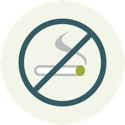Impact on Asthma
Firsthand or secondhand tobacco smoke is an irritant for people with asthma and other respiratory problems. Cigarette smoke contains many harmful substances (tar, carbon monoxide, nicotine, and others), making exposure to secondhand smoke possibly more harmful than the smoke inhaled by the smoker. When people with asthma are exposed to tobacco smoke, they are more likely to experience wheezing, coughing, and shortness of breath.
Tobacco-free policies not only eliminate smoke and promote indoor and outdoor air quality, such policies can also contribute to a tobacco-free culture.
Policy Guidance
The Smoke-free Workplace Law requires all enclosed workplaces to remain smoke-free, including school buildings. Moreover, the Education Reform Act prohibits students enrolled in primary/secondary public schools from using tobacco products of any type on schools grounds during school hours. The Education Reform Act also requires that prohibited tobacco behaviors be outlined in school handbooks.
Massachusetts Tobacco-Free School Policy Guide, Massachusetts Department of Public Health, Massachusetts Department of Elementary and Secondary Education: Laws and guidelines related to school tobacco policies, and guidance to help schools establish tobacco-free environments and provide effective educational programs to prevent tobacco use
Example Policies
A comprehensive school tobacco policy that is strongly enforced is the foundation of a school tobacco prevention program and promotes the creation of a tobacco-free culture. A good school tobacco policy clearly details what acts are prohibited, including when, where, and for whom they are prohibited. The policy should include the following components:
Rationale
Policy text
Education
Communication
Cessation services
Enforcement options
Penalties
Evaluation
Tobacco-free Environment Policy, Boston Public Schools
State of North Carolina Tobacco-free Violation and Intervention Policy, American Lung Association
Sample Comprehensive Tobacco-free School Policy, Arkansas Department of Public Health
Best Practices
Inform everyone — students, school staff, parents, and visitors — of the tobacco-free policy, by posting signs in the school and on school grounds, and including reminders in school newsletters, website, etc. Educate the school community about secondhand tobacco smoke as an asthma trigger.
Offer, or direct people to, cessation programs and/or other resources; be sure to make these resources available to staff as well.
Have a plan for enforcement. Identify people who will be responsible for enforcement, provide resources and training on how to handle violations, and create a process for handling complaints or violation disputes.
Routinely update the school tobacco policy to include emerging products such as e-cigarettes and other tobacco products, including but not limited to cigars, pipes, snuff, and chewing tobacco.
Start an 84 Chapter. The 84 is a statewide movement of youth fighting tobacco in Massachusetts. Schools across the state create their own chapter and members educate community leaders, legislators, and peers about tobacco industry tactics and work to prevent tobacco use.
Resources & Tools
Make Smoking History, Massachusetts Department of Public Health: Free tobacco cessation resources, plus background on smoke-free environments, secondhand smoke, and how the tobacco industry targets youth.
Massachusetts Tobacco Cessation and Prevention Program, Massachusetts Department of Public Health: Background on youth-related tobacco industry tactics, statewide and local laws regulating tobacco products, data about tobacco use in Massachusetts, and tobacco cessation resources.
Comprehensive Tobacco-Free School Policy Toolkit, North Dakota Department of Health: Includes a sample comprehensive tobacco-free school policy, tips for adopting, communicating, and implementing the policy, sample communication pieces, and considerations regarding policy enforcement.
Tobacco-Free Schools for Michigan Youth, Michigan Department of Community Health and Michigan Department of Education: A planning guide that includes a checklist for establishing a tobacco-free school policy, assessment tool to evaluate school tobacco policy, challenges that schools can encounter when implementing and enforcing a tobacco-free policy, and potential solutions to those challenges.
Massachusetts Health Promotion Clearinghouse, Commonwealth of Massachusetts: Free decals, brochures, fact sheets, and other materials to promote tobacco-free school policies.
The 84 Statewide Youth Movement: Massachusetts statewide youth tobacco prevention program engaging youth in tobacco prevention and promoting the message that most youth do not smoke. Schools can host an 84 Chapter, receive free training, and participate in local activities and statewide events.


